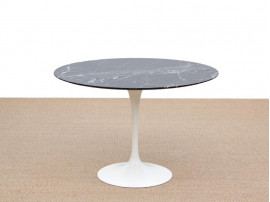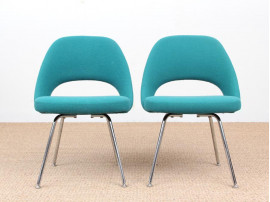
Eero Saarinen
Eero Saarinen
b. Finland 1910-1961
Born to world famous parents, architect and Cranbrook Academy of Art director Eliel Saarinen and textile artist Loja Saarinen, Eero Saarinen was surrounded by design his whole life. It came as no surprise that Eero was helping his father design furniture and fixtures for the Cranbrook campus by the time he was in his teens. In 1929 Eero left for Paris where he studied sculpture before enrolling in the Yale architecture program the following year. In 1934, he returned to Michigan to teach at Cranbrook, work on furniture designs, and practice architecture with his father.
It was at Cranbrook that Saarinen met Charles Eames. The two young men, both committed to the exploration of potential new materials and processes, quickly became great friends, pushing each other creatively while collaborating on several projects. The most notable outcome of their partnership was the groundbreaking collection of molded plywood chairs for the MoMA-sponsored 1940 Organic Design in Home Furnishings competition. Their collection was awarded first prize in all categories, catapulting the young designers to the forefront of the American modern furniture movement.
Saarinen also met Florence Knoll (né Schust) at Cranbrook, who at that time was a promising young protégé of Eliel Saarinen. Florence spent all of her free time with the Saarinen family, including summer vacations to Finland. Florence and Eero developed a brother-and-sister-like relationship that would last the rest of their lives. Florence later recalled that her history with Eero made him her most honest and, often, harshest critic. When Florence joined Knoll in the 1940s, it was an obvious choice for her to invite Eero to design for the company.
Back row from left: Eero Saarinen, Lily Swann Saarinen and Florence Schust Knoll. Middle row: Eliel Saarinen, Loja Saarinen and Hans Knoll. Eric Saarinen seated on rocking horse. Copyright Cranbrook Archives, Saarinen Family Papers. CEC 496
Over the next 15 years Saarinen designed many of the most recognizable Knoll pieces, including the Tulip chairs and tables, the Womb chair, and the 70 series seating collection. Eero, who was known for being obsessed with revision, took a sculptural approach to furniture design, building hundreds of models and full scale mock-ups to achieve the perfect curve, find the right line, and derive the most pleasing proportions. His designs, which employed modern materials in graceful, organic shapes, helped establish the reputation and identity of Knoll during its formative years.
In addition to his achievements in furniture, Eero Saarinen was a leader of the second-generation modernists. Constantly pushing material and aesthetic boundaries, Saarinen expanded the modern vocabulary to include curvilinear and organically-inspired forms not found in the work of his predecessors. Among his outstanding projects are the Dulles International Airport in Washington, DC, The Gateway Arch in St. Louis, Missouri, the TWA Terminal at Kennedy International Airport, and the CBS headquarters in New York.


